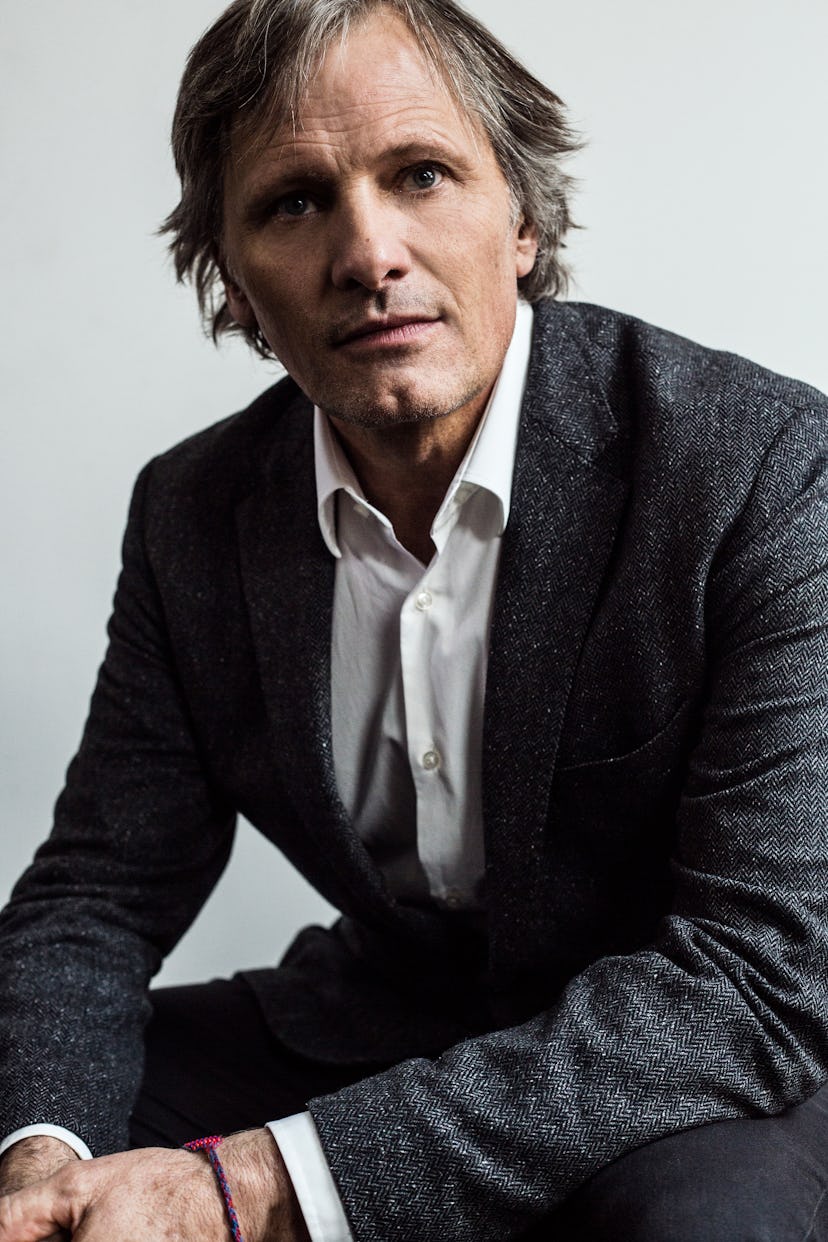Viggo Mortensen on His Idealistic New Film “Captain Fantastic”
Acclaimed at both Sundance and Cannes, the film might strike a chord with the idealistic Bernie Sanders movement.

“You don’t mind if I smoke, do you?” Viggo Mortensen asked, shielding his bright blue eyes with a pair of old Ray-Bans from a sun-drenched roof in Cannes, France during the famous film festival. I had recently quit, so I did mind, in fact, but how could I say no? It’s Viggo! He’s Aragorn and Joey Cusack and “The Man” from The Road.
He mindfully lit up at a pace so slow that I couldn’t help but admire his sangfroid. He was impressively calm and collected, despite being in the midst of a grueling twelve-hour press day (this was hour five) for Matt Ross’ film Captain Fantastic, which opened in the Un Certain Regard category the night before at the Grand Palais to rave reviews and a standing ovation. (Ross eventually took the Best Directing prize; in January, the film premiered to an equally rapturous reception at the Sundance Film Festival.)
But Mortensen moves at his own pace in all areas of his life, having long settled in Spain with his girlfriend, where he remains completely under the radar and far removed from the glitz and blaring racket of Hollywood, with no more technology than a flip phone, choosing roles only if he truly believes in them.
It makes sense that the lead role of Ben in Captain Fantastic, which opens today nationwide, ** appealed to him. He plays a father of six who is forced to bring his family into society after raising them in the utopian wilderness since birth, despite his stubborn aversion to the loudness of modern life.
Mortensen admitted that when he first read the script, he was immediately touched by its emotionality and intelligence. “I really took my time reading it. I would put it down and read it again,” he explained. “I found myself laughing and very moved at times. It’s not a movie that’s political or ideological, but it has so many layers to it.” Still, at Sundance, the film struck a chord with the idealism of the then nascent Bernie Sanders movement.
Filmed in a bucolic forest in the Pacific Northwest, Mortensen along with his six junior cast mates – most of them first-time actors except British newcomer George MacKay – meticulously honed skills one needs to survive in the great outdoors, such as skinning, butchering, martial arts training, fire starting, and rock climbing, which forced Mortensen to face his fear of heights – or what Mortensen lovingly refers to as “boot camp.”
“When everyone climbed down for lunch, I was still standing up there,” he said, laughing. “The kids were like ‘Viggo come down to lunch!’ and I said ‘No, just send a sandwich up!’ I was absolutely terrified. I couldn’t look down.” The bonding was crucial to their infection on-screen camaraderie.
“Matt and his producers were great at allowing a family atmosphere to happen organically, we didn’t have to pretend we liked each other,’” Mortensen said. “The kids called me their ‘summer dad.’”
Boot camp also included music sessions, to establish an “unspoken, non-verbal language” between the cast members. In the spirit of film, Ross even instated a no-phone or junk food policy on-set. “It’s unheard of on a movie for there not to be candy and soft drinks, but the kids got into it, they liked it,” Mortensen said.
As depicted in the film, Ben’s children are incredibly considerate of one another. They respectfully listen to what each other has to say, help one another whenever possible, and problem-solve as a team. Educationally, Ben has flawlessly executed his own home-schooling curriculum that includes German philosophy, mathematics, and world politics (the kids can recite the Bill of Rights verbatim). It’s a fantasy worthy of admiration, even if in the end Ben discovers that isolation has its problems too. While Ben is chastised by his father-in-law, played by the great Frank Langella, for his grandchildren’s, unrealistic and at times perilous upbringing, Mortensen’s real life views lie somewhere in the middle.
“Whatever your family situation is, I think what matters is that you are involved, connected, and talking. That’s not radical no matter where you are,” he said. “This family works because of their open connections and their commitment to being completely honest, permanently curious, showing mutual respect, and having an open discourse. That’s not so crazy.”
For Viggo, the film was also a lesson in self-reflection. “I stopped to think, ‘Am I doing the best I can in life? Are we evolved enough in communicating, parenting, and are we looking past our differences [as a society]?’ I respected [Ben’s] ability to change and adapt. People need to at least be open to changing their mind, open to what other people think and have to say.”
Watch this video on The Scene.
Photos: Viggo Mortensen on His Idealistic New Film “Captain Fantastic”
Photo by Victoria Stevens. Produced by Biel Parklee.
Photo by Victoria Stevens. Produced by Biel Parklee.
Photo by Victoria Stevens. Produced by Biel Parklee.
Photo by Victoria Stevens. Produced by Biel Parklee.
Viggo Mortensen in a scene from “Captain Fantastic.”
Viggo Mortensen in a scene from “Captain Fantastic.”
Viggo Mortensen in a scene from “Captain Fantastic.”
Viggo Mortensen in a scene from “Captain Fantastic.”
Viggo Mortensen and his on-screen family, including (third from the left) George MacKay, in a scene from “Captain Fantastic.”
Viggo Mortensen in a scene from “Captain Fantastic.”
Viggo Mortensen and director Matt Ross (far right) in a scene from “Captain Fantastic.”
Viggo Mortensen in a scene from “Captain Fantastic.”
Viggo Mortensen in a scene from “Captain Fantastic.”
Viggo Mortensen in a scene from “Captain Fantastic.”